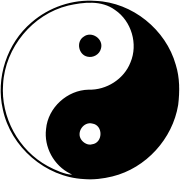
Universal dialectic
Encyclopedia

Ontology
Ontology is the philosophical study of the nature of being, existence or reality as such, as well as the basic categories of being and their relations...
idea which is closely related to the Taoist
Taoism
Taoism refers to a philosophical or religious tradition in which the basic concept is to establish harmony with the Tao , which is the mechanism of everything that exists...
and Neo-Confucian concept of taiji
Taiji
Taiji 太極 is a Chinese cosmological term for the "Supreme Ultimate" state of undifferentiated absolute and infinite potentiality, contrasted with the Wuji 無極 "Without Ultimate"...
or "supreme ultimate." In the West, dialectician
Dialectician
A dialectician is a philosopher who views the world in terms of complementary opposites and the interactions thereof. In popular usage, the central feature of dialectic is the concept of "thesis, antithesis, synthesis" - when an idea or phenomenon arises, it carries within itself the seed of its...
s including Hegel
Georg Wilhelm Friedrich Hegel
Georg Wilhelm Friedrich Hegel was a German philosopher, one of the creators of German Idealism. His historicist and idealist account of reality as a whole revolutionized European philosophy and was an important precursor to Continental philosophy and Marxism.Hegel developed a comprehensive...
explored themes that some see as remarkably similar, laying the groundwork for unification. Universal dialectic is envisioned as a single fundamental creative principle of inherent complementarity, as inspired by Heraclitus
Heraclitus
Heraclitus of Ephesus was a pre-Socratic Greek philosopher, a native of the Greek city Ephesus, Ionia, on the coast of Asia Minor. He was of distinguished parentage. Little is known about his early life and education, but he regarded himself as self-taught and a pioneer of wisdom...
. However, rather than manifesting only cyclical change (as was the Greek view), it is progressive in nature, bringing about states of increasing complexity through a dialectical process of synthesis
Thesis, antithesis, synthesis
The triad thesis, antithesis, synthesis is often used to describe the thought of German philosopher Georg Wilhelm Friedrich Hegel. Hegel never used the term himself, and almost all of his biographers have been eager to discredit it....
.
Accordingly, the term "universal dialectic" can be seen as part of an attempt to Westernize and/or modernize the concept of taiji in regard to the fundamental role and nature of complementary opposites in the ongoing self-organizing
Self-organization
Self-organization is the process where a structure or pattern appears in a system without a central authority or external element imposing it through planning...
process of creation. It associates this traditionally Eastern view with the concept of dialectic
Dialectic
Dialectic is a method of argument for resolving disagreement that has been central to Indic and European philosophy since antiquity. The word dialectic originated in Ancient Greece, and was made popular by Plato in the Socratic dialogues...
advocated by Socrates
Socrates
Socrates was a classical Greek Athenian philosopher. Credited as one of the founders of Western philosophy, he is an enigmatic figure known chiefly through the accounts of later classical writers, especially the writings of his students Plato and Xenophon, and the plays of his contemporary ...
, Hegel, and Marx
Karl Marx
Karl Heinrich Marx was a German philosopher, economist, sociologist, historian, journalist, and revolutionary socialist. His ideas played a significant role in the development of social science and the socialist political movement...
. This Western influence adds a progressive element to the inexorable process of change, a concept which is absent in Oriental thought.

